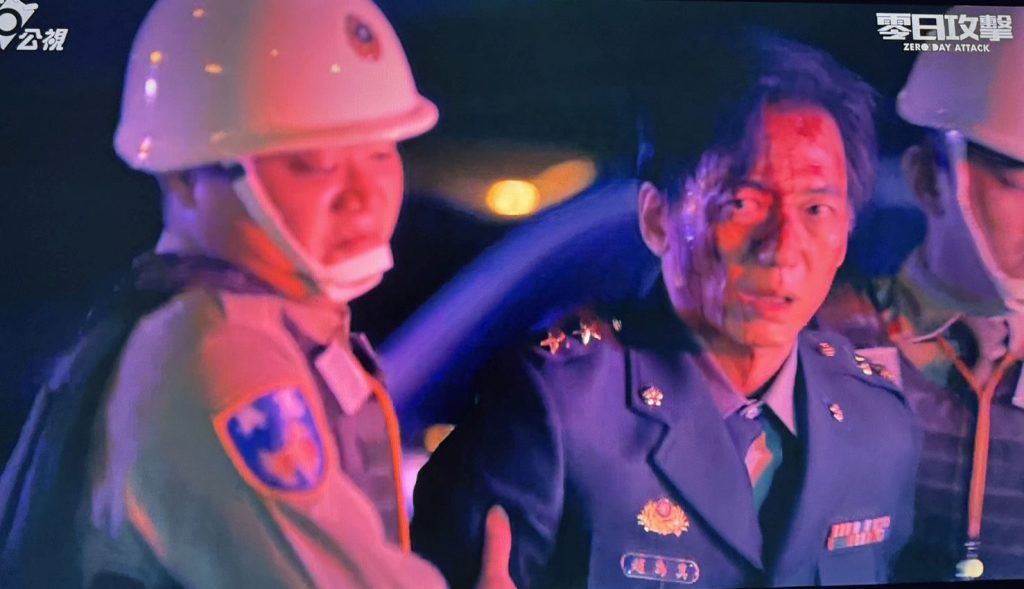By Ross Darrell Feingold
WARNING: The following article contains MAJOR SPOILERS related to the recently released TV drama Zero Day Attack. If you haven’t seen it and are planning on doing so, it’s probably best you DO NOT READ this review.
Editor’s Note: Zero Day Attack Episode 9 occurs in Kaohsiung; the following commentary was published after the episode aired.
First, a warning: Zero Day Attack Episode 9 has scenes of sex, as well as gun violence. Although the gun violence is relevant to a story about an invasion of Taiwan by China, the sex scene, just as in earlier episodes that had sex scenes, had no point other than to show that some of the characters are horny.
Episode 9 occurs in Kaohsiung, and the main character is a gangster named “Brother Chiang” (強哥), who appeared in earlier episodes. The plot involves Brother Chiang’s friends, many of whom are from Hong Kong.
Brother Chiang’s good friend A-Sen (阿森) is a former city councilor who was in prison for election bribery. After A-Sen is released from prison, Brother Chiang plans for A-Sen to organize a “prison break” together with a corrupt senior prison officer because the prison officer is fooled into believing that Brother Chiang can help arrange surgery for the prison official’s daughter.
Although it is not explained clearly, it appears that with a Chinese invasion imminent, it is difficult to arrange surgeries; perhaps the doctors have fled Taiwan.
Brother Chiang orders A-Sen to take the escaped prisoners to a police station, where the very first thing they do is execute the duty officer at the front desk. Strangely, there are no other police officers in the building to fight back against the escaped prisoners’ occupation of the police station.
A television news reporter happens to witness the escaped prisoners entering the police station, and she begins to report their presence on live television news.
This results in the sudden appearance outside the police station of a car caravan of men waving People’s Republic of China flags and chanting “The government is rotten, people arise!” (政府擺爛,人民起來); this caravan was seen earlier in Episode 9 driving around Kaohsiung, chanting the same slogan.
It turns out that the men in the car caravan and the escaped prisoners are both being manipulated by Brother Chiang. The men in the car caravan have brought heavy weapons, and a gun battle erupts between the two groups.
It’s unclear why Brother Chiang is engaged in this “divide and conquer” activity, other than maybe his goal is to create as much chaos in Taiwanese society as possible.
Shortcomings of Episode 9:
- Brother Chiang seems to have some instructions from China to cause chaos in Kaohsiung, but the writers made an effort to show how it is connected to a broader plan by China to conquer Taiwan.
- A better story would have shown people similar to Brother Chiang in other parts of Taiwan, who are assisting China to weaken Taiwan’s internal cohesion and make a Chinese invasion easier.
- If one of the justifications to spend so much Taiwan taxpayer money on Zero Day Attack was to encourage international support for Taiwan, then, Episode 9, like previous episodes, is a failure. People outside Taiwan will struggle to understand the plot of Episode 9; they can understand a gun battle between Taiwan’s military and China’s military, but not a gun battle between two groups of villains outside a Kaohsiung police station.
- In addition, it would help people outside Taiwan understand that Brother Chiang is working for China if he were shown receiving a phone call from his superiors in China, or if there was a “flashback” scene of Brother Chiang meeting with Chinese government officials to plan his activities in Taiwan.
On September 15, 2021, in The Wall Street Journal, former United States National Security Adviser Robert O’Brian wrote that a priority for Taiwan “should be delivering shoulder-fired Stinger missiles to strategic locations, such as Taiwan’s more than 2,000 police stations”. Maybe the writers of Episode 9 forgot about O’Brien’s suggestion! If they had remembered it, there would have been Stinger missiles inside the police station for the escaped prisoners to use as part of the gun battle.
Note: This article first appeared in “Ross Feingold on International Politics” on September 28, 2025. Image via @RossFeingold.

is the head of research at risk consultancy Caerus Consulting and a special counsel to Titan Attorneys-at-Law. He is an expert in trade policy, regulatory matters, and international relations who advises corporations, investors, and nonprofit organizations throughout Asia on due diligence, political risk and business development. Mr. Feingold authors the “Taiwan Politics Review” monthly column for the European Chamber of Commerce Taiwan, teaches “American Foreign Policy” at Tamkang University, and is a policy adviser to the Taipei City Government. Mr. Feingold is a frequent commentator for Al-Jazeera, Channel News Asia, NewsX, Radio Free Asia, Radio Television Hong Kong, and Voice of America, among other media networks, and he has previously hosted programs in English and Mandarin in Taiwan. Mr. Feingold is a director of The Association of Americans Resident Overseas, a non-partisan advocacy group for the millions of overseas American citizens. In this capacity, he meets the U.S. government and Congressmen to advocate for expatriates on tax and banking issues. Mr. Feingold was the founding chairman of The Chabad Taipei Jewish Center, and earlier served as the Asia chairman of Republicans Abroad, the international organization of the Republican Party. Mr. Feingold speaks Mandarin and first lived in Asia in 1994, and subsequently has lived in Hong Kong, Singapore, and Taiwan.



